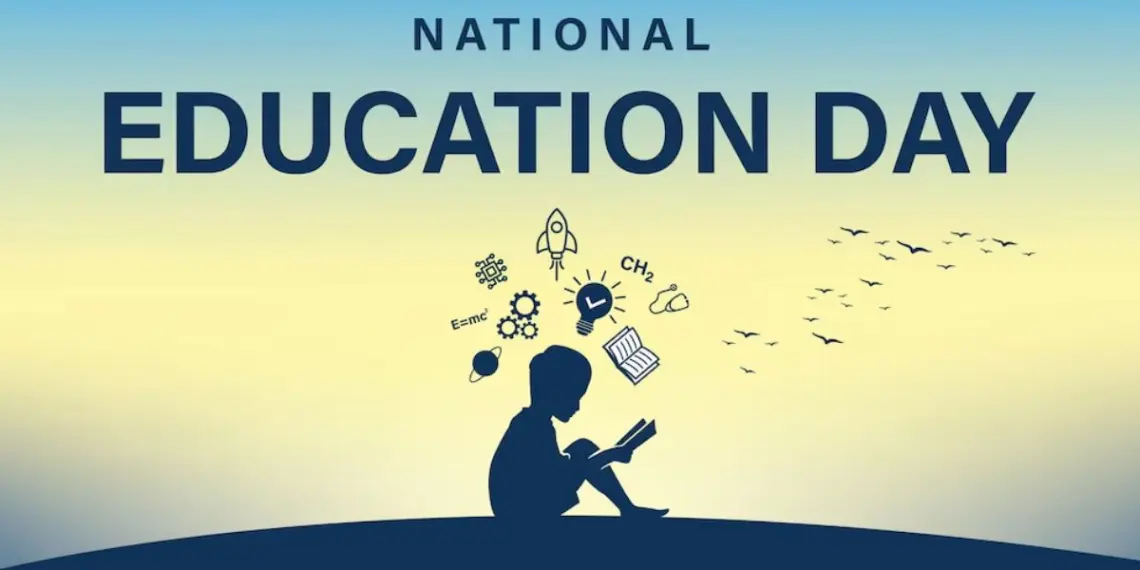Every year, 11 November is celebrated as National Education Day, which commemorates the birth anniversary of independent India’s first education minister, Maulana Abul Kalam Azad. In 2008, the Ministry of Human Resource Development (Now the Ministry of Education) decided to celebrate Azad’s birthday as National Education Day. Educational institutions across India mark the event with seminars, essay-writing, workshops, etc, to highlight the importance of education. The nation’s demographic dividend (65 % of its population below 35 years of age) offers a huge potential to build a well-educated nation. The empowerment of youth is thus critical for taking India to new heights. The Government of India is committed to securing the future of the country by placing special emphasis on building a strong and effective education infrastructure catering to the holistic development of students and youth.Maulana Abdul Kalam Azad, also known as Abdul Kalam Ghulam Muhyiddin, was a multifaceted personality who played a pivotal role in shaping modern India. His early education was informal, but he demonstrated exceptional intellectual prowess from a young age. As he grew, he became deeply involved in the Indian freedom struggle. He was not only an eloquent orator and a prolific writer, but he was also the youngest person to have served as the president of the Indian National Congress. His passion for education and his unwavering commitment to the betterment of the nation earned him the epithet “Maulana”, an honorific title meaning “learned one. Maulana Abul Kalam Azad’s contribution to the field of education was immense. He firmly believed that education was the most potent weapon that could be used to transform society and empower the masses. As India’s first Minister of Education, he laid the foundation for the country’s modern education system. His tireless efforts led to the establishment of the University Grants Commission (UGC) and the Indian Institutes of Technology.
Perhaps his most enduring legacy is the establishment of the Indian Institutes of Technology, which are globally renowned for producing some of the brightest minds in science and technology. He also played a significant role in promoting the study of science and technology in India, recognising their pivotal role in the country’s development. Maulana Azad’s dedication to education is best exemplified by his assertion that “Educationists should build the capacities of the spirit of inquiry, creativity, entrepreneurial, and moral leadership among students and become their role model”. In recognition of Maulana Abul Kalam Azad’s exceptional contributions to education and his tireless efforts to make education accessible to all, National Education Day (National Day of Education) is celebrated on his birthday, November 11th, each year. It serves as a tribute to his vision and unwavering commitment to the cause of education, inspiring generations to come.
National Education Day in India holds a unique and profound significance, reflecting the nation’s commitment to education and its potential for transformation. Here, we outline the key reasons why celebrating National Education Day in India is of utmost importance, emphasising its role in the country’s educational and societal landscape.National Education Day in India serves as a tribute to Maulana Abul Kalam Azad, an iconic leader who played an instrumental role in shaping the nation’s education system.His vision, dedication, and tireless efforts are celebrated, inspiring the nation to carry forward his educational legacy.
Celebrating National Education Day in India reinforces the nation’s commitment to providing education to all, emphasising the importance of equitable, inclusive, and high-quality educational opportunities.This celebration serves as a reminder of the government’s obligation to eliminate educational disparities and ensure that every child has access to education.In India, the celebration of National Education Day highlights the pivotal role of education in fostering a knowledge-based society. Knowledge and innovation are instrumental to the nation’s overall development.This observance encourages investment in education, research, and innovation as vital contributors to India’s economic and social progress.
Education empowers individuals, equipping them with skills and knowledge for personal development and self-reliance. National Education Day in India emphasises the transformative power of education in creating a brighter future for its citizens.Education is not just about academics but also about instilling values and preserving cultural heritage. In India, this day underscores the role of education in nurturing a sense of national identity and promoting cultural diversity.National Education Day in India encourages lifelong learning, emphasizing that education is an ongoing journey. People of all ages are encouraged to continue seeking knowledge, adapting to change, and fostering a culture of continuous learning.
This observance provides a platform to highlight the educational challenges in India, including issues related to access, quality, and relevance.It encourages dialogue and action to improve the country’s educational system.Celebrating National Education Day in India aligns with global initiatives, such as the United Nations Sustainable Development Goals, particularly Goal 4, which focuses on ensuring inclusive and equitable quality education.National Education Day in India is more than a commemoration; it is a rallying point for advancing education, ensuring equal opportunities, and building a brighter future for the nation’s citizens. It underscores the pivotal role of education in India’s growth and development.


